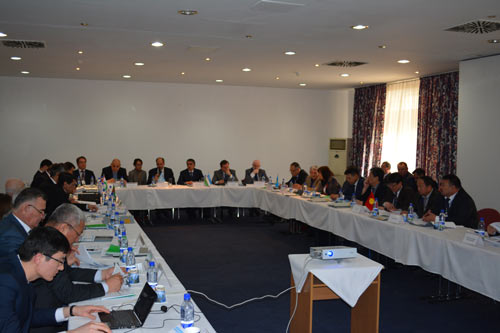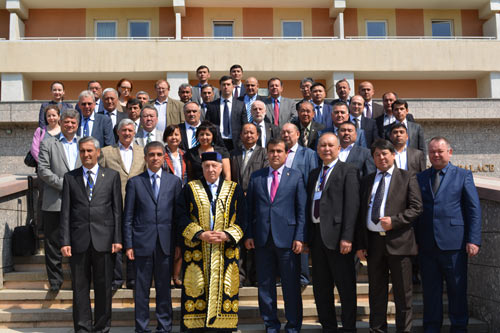REGULAR 63RD MEETING OF THE INTERSTATE COMMISSION FOR WATER COORDINATION
On April 18-19, 2014, the regular 63rd meeting of the Interstate Commission for Water Coordination was hold in Tashkent and chaired by Khamraev Sh.R., acted as the Chairman of the ICWC Executive Committee, Deputy Minister, Head of the Central Water Administration under the Ministry of Agriculture and Water Resources of the Republic of Uzbekistan.

The agenda included the following issues:
1. About results of the non-growing season of 2013–2014 and approval of diversion limits, reservoir cascade operation modes at the next growing season of 2014 for the Amudarya and Syrdarya basins.
2. Consider completed versions of the Concept for developing information exchange and relationship mechanisms among its participants in Central Asia and Agreement on Establishment and function of national, basin and regional data bases of integrated use and conservation of water resources in the Aral Sea basin, and Temporal regulations for use of regional information system on water and land resources of the Aral Sea basin.
3. Consider completed versions of Plan for achievement of the primary areas in improvement of ICWC activity and Strategy of capacity building in the water sector of CA countries (responsible SIC ICWC).
4. The agenda and venue of the next 64th ICWC meeting.
Additional issues
1. Regarding preparation to the 7th World Water Forum
2. Personnel affairs.
Appropriate decisions were made for all the issues.

Materials of the meeting will be published in the regular ICWC bulletin, which is planned to publish in mid of 2014.
JOINT WORKSHOP ON INTEGRATED WATER RESOURCES MANAGEMENT IN CENTRAL ASIA
Workshop on Integrated Water Resources Management in Central Asia was hold in Tashkent on April 18-19, 2014. Organizers of the workshop were Scientific Information Center of ICWC, IFAS Executive Committee, Regional Centre for Preventive Diplomacy for Central Asia, UNDP and Ministry of Agriculture and Water Resources in the Republic of Uzbekistan.

The workshop was organized as 4 sessions.
Session “Understanding and main principles of IWRM. International practice and tendencies” considered issues regarding international practice and existing IWRM tendencies in the world. Joop de Schutter, UNESCO-IHE representative, familiarized participants with IWRM concept development and practical application in activities of joint bodies for the Nile, Mekong, and Danube, whose work experience can be useful in strengthening existing regional institutes in Central Asia. Representatives from Global Water Partnership told about available IWRM mechanisms and tools, as well as specific measures carried out by GWP in Central Asia and the Caucasus to move forward the IWRM principles. The auditory were also familiarized with the main IWRM principles in international law and issues of IWRM sustainable development.
Session “IWRM at regional level and support of international organizations in this issue” was devoted to experience of implementing international projects and programs on IWRM issues in the region and individual countries of Central Asia. In particular, results of the projects implemented with support of Switzerland, Germany and UNDP were presented. Rapporteurs mentioned that those projects assisted in adapting the IWRM principles to local specifics and conditions, and demonstrated that proper IWRM implementation significantly increases water use efficiency and justice for all categories of water users.
At the session “IWRM principles implementation in Central Asia countries”, representatives from Kazakhstan, Kyrgyzstan, Tajikistan, Turkmenistan, and Uzbekistan familiarized the auditory with achievements and challenges of IWRM implementation in their countries. It was noted that since there is already specific experience in IWRM implementation issues in every CA country, it is important to continuously exchange information on achievements and lessons learnt during the process of reform implementation between countries.
At the session “IWRM application prospects in Central Asia”, SIC ICWC Director Prof. Dukhovny V.A., based on the analysis of IWRM implementation experience in Central Asia, outlined main steps for its further development in the region, with regard to improving management and government of water supply and demand, and capacity building as well. In particular, he mentioned that any way of IWRM implementation should be integrated and integral, i.e. to consider interrelations and interaction of different water hierarchy levels and associated sectors.

|